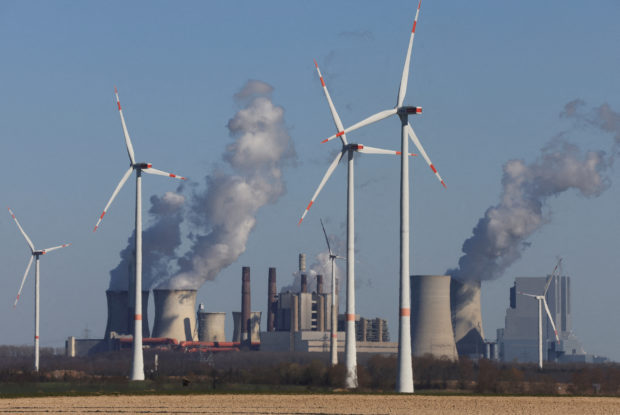Europe races to prepare for energy crunch this winter

Wind power stations of German utility RWE, one of Europe’s biggest electricity companies are pictured in front of RWE’s brown coal fired power plants of Neurath near Jackerath, north-west of Cologne, Germany. REUTERS/Wolfgang Rattay/File photo
BERLIN/PARIS -European governments outlined new measures on Monday to cope with potential energy shortages this winter and raced to improve energy networks to share power, with Russian gas flows still running at severely reduced rates amid the Ukraine war.
Germany said it was expecting to sign liquefied natural gas (LNG) contracts in the United Arab Emirates. With the major Nord Stream 1 pipeline to Russia shut, it is planning to build new LNG terminals to ship in gas, while European partners Spain and France were also working on contingency plans.
“If everything goes well, savings in Germany are high and we have a bit of luck with the weather, we … have a chance at getting through the winter comfortably,” Economy Minister Robert Habeck said after a tour of a future LNG terminal in Lubmin in northern Germany.
Habeck said Germany will not let large gas importers like VNG become insolvent, while an economy ministry spokesperson said “focused” discussions on aid were ongoing with ailing importer Uniper.
Russia, which had supplied about 40 percent of the European Union’s gas before its February invasion of Ukraine, has said it closed the pipeline because Western sanctions hindered operations. European politicians say that is a pretext and accuse Moscow of using energy as a weapon.
German buyers briefly reserved capacity on Monday to receive Russian gas via the Nord Stream 1 pipeline, once one of Europe’s major gas supply routes, for the first time since the line was shut three weeks ago. But they soon dropped the requests.
It was not immediately clear why buyers had submitted requests for capacity when Russia has given no indication since it shut the line that it would restart any time soon.
Russian gas flows to Europe via Ukraine, although much reduced, have continued.
But the sharp drop in Russian fuel exports, in retaliation for Western sanctions over Moscow’s invasion of Ukraine, has left governments scrambling to find energy resources, but also to warn that power cuts could happen, amid fears of recession.
The German economy is contracting already and will likely get worse over the winter months as gas consumption is cut or rationed, the country’s central bank said on Monday.
Power cuts?
In France, exports of natural gas to Germany could start around Oct. 10, the head of France’s CRE energy regulator said, following an announcement by President Emmanuel Macron that the two EU neighbors would help each other with electricity and gas flows.
“Gas was (until now) only flowing from Germany to France, so we did not have the technical tools to reverse the flows and we did not even have a method to regulate prices,” CRE chief Emmanuelle Wargon told franceinfo radio.
While French energy group EDF is racing to repair corrosion-hit nuclear reactors, “exceptional” measures this winter could include localized electricity cuts if the winter is cold and EDF’s plans are delayed, Wargon said.
“But there will be no gas cuts for households. Never,” she said.
Spanish Industry Minister Reyes Maroto said that obliging energy-intensive companies to close down during consumption peaks is an option on the table this winter if required.
The companies would be compensated financially, she said in an interview with Spanish news agency Europa Press, adding there is no need to impose such closures now.
And Finns were warned by national grid operator Fingrid that they should be prepared for power outages.
Reflecting the disruptions caused across the continent, Finnish power retailer Karhu Voima Oy said it had filed for bankruptcy due to a sharp rise in electricity price rises.
”Going back in time”
Meanwhile, Ukraine accused Russian forces of shelling near the Pivdennoukrainsk nuclear power plant in Ukraine’s southern Mykolaiv region.
Since its forces were driven out of Kharkiv, Russia has repeatedly fired at power plants, water infrastructure and other civilian targets in what Ukraine says is retaliation for defeats on the ground. Moscow denies deliberately targeting civilians.
European gas storages are now 85.6 percent full, with stocks in Germany close to 90 percent, data from Gas Infrastructure Europe showed.
“Stocks are set to continue to be built further, supported by the finalization of planned maintenance work and increasing Norwegian flows as of this week,” analysts at Energi Danmark said in a morning note.
Meanwhile, Europe’s imports of thermal coal in 2022 could be the highest in at least four years, analysts said.
European imports of thermal coal this year could rise to about 100 million tons, the most since 2017, according to Noble Resources International Pte Ltd, while commodities pricing agency Argus expects shipments to reach a four-year high.
“Europe is going back in time,” Rodrigo Echeverri, head of research at Noble, told a conference.
Oil prices fell by more than 1 percent on Monday, pressured by expectations of weaker global demand and by U.S. dollar strength ahead of a potentially large interest rate hike, though supply worries limited the decline.
Oil has also come under pressure from forecasts of weaker demand, such as last week’s forecast from the International Energy Agency that the fourth quarter will see zero demand growth.